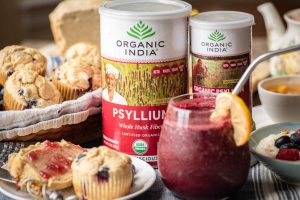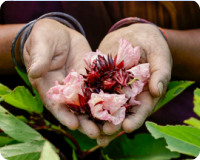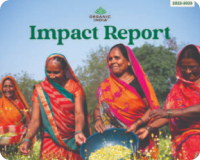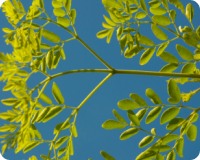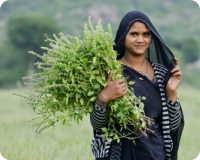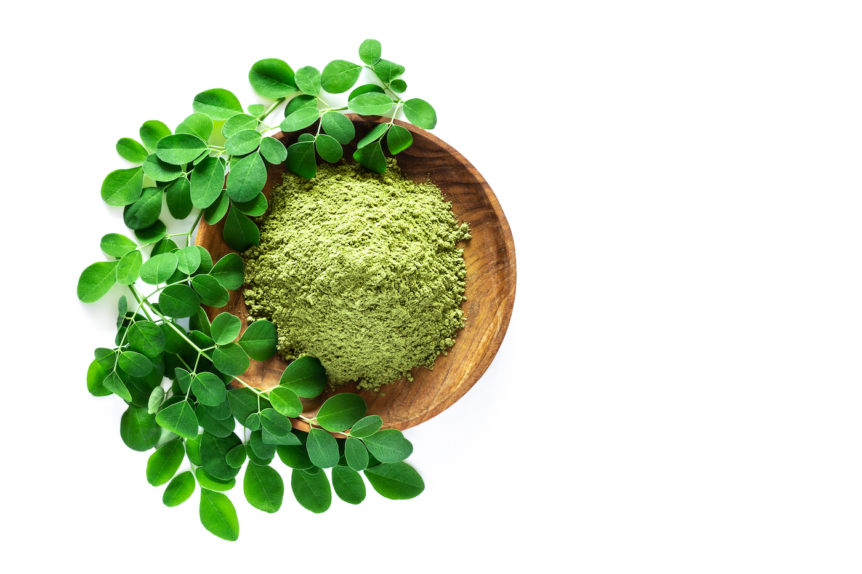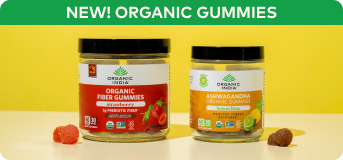

Section

Back
The human immune system is a marvelous network of tissues, cells, and organs designed to protect and defend the body from foreign invaders ranging from toxins to artificial ingredients. Herbalists, nutritionists, and natural healthcare practitioners are always on the lookout for plants that gives this special system an extra boost. There are a great number of herbs that come to mind, but organic Moringa is garnering more and more attention as time rolls on, because it has so many applications.
Moringa is often called the drumstick tree, but is also known as the miracle tree, the ben oil tree, and the horseradish tree. Native to regions of Afghanistan, India, Bangladesh, and Pakistan, and growing abundantly throughout the tropics, as well as in the Himalayas, ancient cultures have referred to moringa as the Tree of Life. Moringa’s delicate leaves pack a punch when it comes to nutritional value.
Ounce for ounce, moringa provides four times the amount of calcium as milk, more vitamin C than seven oranges, and twice the amount of protein and three times the amount of potassium of a banana.
Moringa offers more nutrition than kale, with more than 90 nutrients and 40-plus antioxidants. Researchers say that this tree’s superb supply of healing substances is why the plant ranks so highly among the most prized superfoods. Ounce for ounce, moringa provides four times the amount of calcium as milk, more vitamin C than seven oranges, and twice the amount of protein and three times the amount of potassium of a banana. Moringa is a great source of iron and therefore has been used traditionally for cases of anemia. While beef has only two milligrams of iron, moringa leaf boasts more than 28 milligrams — more iron than spinach.
Moringa offers anti-inflammatory benefits, as well as nutrients associated with antiviral and antibacterial activity, rivaling esteemed turmeric — one of the favorite plants of natural healers throughout India. From the roots to the seeds, moringa is a storehouse of healing biochemicals known well to practitioners of Ayurveda, as well as to natural healers of the Western world.
Moringa Supports the Immune System
In Ayurveda, Moringa is unrivaled when it comes to boosting the immune system. The Central European Journal of Immunology reported that medicinal plants, such as Moringa, play significant roles in protection from pathogenic microorganisms and diseases. Moringa is used as an immunomodulatory agent — a substance that regulates the immune system, including both innate and adaptive immune responses. The plant offers immune system support by way of increasing white blood cell counts and immunoglobulin levels. White blood cells fight infection and disease, and immunoglobulins (also known as antibodies) are molecules produced by white blood cells. They act as a critical part of the immune response by recognizing and binding to certain antigens, such as bacteria or viruses, and contributing to their destruction.
Researchers reported that moringa increases at least two important factors related to the efficiency of the immune system — CD4s and T-cells. CD4, which stands for “cluster of differentiation 4” is a glycoprotein (outer coating of a cell) found on the surface of immune cells such as T helper cells, monocytes, macrophages, and dendritic cells. T cells, also called T lymphocytes, are a type of white blood cell that is an essential part of the immune system. T cells help determine how the immune system responds to antigens (foreign substances) in the body.
While germs abound in the natural world, Ayurvedic doctors argue that good health is actually a matter of the harmonious function of every bodily system, right down to the cells. This balance is often threatened by poor diets, microbial agents, and foreign invaders. But when the body is in harmony, including with the mind and emotions, then good health is the reward. A strong and optimally functioning immune system is required to maintain this balance — not only to provide cellular protection, but also to fight off incoming chemicals that rob oxygen from the cells (often called free radicals), to stimulate while blood cell activity, and to keep the immune-specific organs operating efficiently.
A Wonderment Among Healing Plants
Instructors at the Sai Ayurvedic College in Florida teach that moringa has been used as part of the diet in India for ages. Its clinical use has been a part of Ayurvedic healing since the time of the ancient healer known as Sushruta, “The Father of Indian Medicine,” around 800 BCE.
While Moringa has potential as a curative for a vast number of ailments and symptoms, it is also used for patients suffering from malnutrition. Science has yet to elucidate all of the chemicals that moringa offers as healing agents and immune system boosters. Regardless, doctors of natural healthcare are most interested not only in traditional usage of the tree and all its parts, but also the holistic effect of the myriad phytonutrients that work together for healing, nourishment, and prevention.

